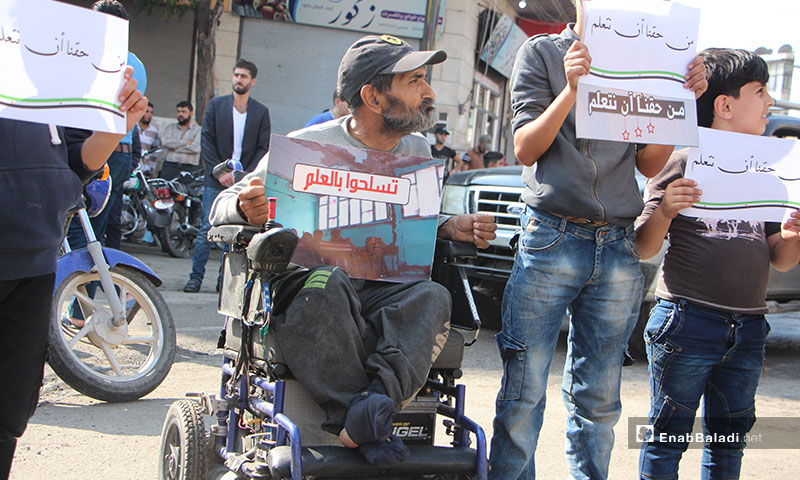



Funding cuts have taken their toll on the educational sector in northwestern Syria, affecting the future of about one million students since the beginning of the current school year. The schools, however, continue to provide educational services to the students in the face of rapidly growing difficulties and the long wait for a solution.
Demonstrations were held throughout the area calling for the return of the support and to save the educational system. The response of civil society organizations has not been sufficient to address the needs of the educational sector and the growing deficit of education directorates.
“The teaching cadres in Idlib are challenging the lack of funding to maintain the education of Syrian children and provide them with educational services,” said Mustafa Haj Ali, head of the media office of the education directorate in Idlib, in an interview with Enab Baladi.
The education directorate of Idlib began its school year with 350 schools less out of the 1,194 available. This was a result of the military campaign launched by the Syrian regime backed by Russia on the southern countryside of Idlib and the northern countryside of Hama. In the course of the campaign, a 100 schools were damaged, 50 schools were looted, while others were converted into temporary shelters for internally displaced people (IDPs).
The sudden withdrawal of financial support from the European Commission (EC), which had been implemented by Chemonics, has deprived 65% of the teaching staff from their salaries, pushing them to continue working on a voluntary basis. Moreover, EC’s support suspension threatens to deny about 410,000 students of their right to access education.
The countryside of Hama lost also most of its schools. 122 schools fell under the control of the Syrian regime and 64 schools were damaged or destroyed by the shelling. 19 schools are still operable, largely thanks to the efforts of volunteer cadres. However, these volunteers which cannot go on like this forever, according to the director of the educational complex in the western countryside of Hama, Khaled al-Fares.
Al-Fares, in an interview with Enab Baladi, pointed out that teachers have difficulties in meeting their families’ needs and ensuring their livelihoods, not to mention the suffering they experience due to the shelling and displacement.
Several teachers, having to look for alternative sources of income, took unpaid leave from their schools threatening the educational process, according to the director of the education directorate in Aleppo, Mohammad Mustafa.
Mustafa added that the education directorate appointed a large number of teachers, who passed the teacher competency test, to fill the vacancies “temporarily.” However, the available number of substitute teachers required to equip classes has not been sufficient.
“Modest” response
Al-Fares said that the directorate of education in the countryside of Hama suffered more losses than others, with the loss of its headquarters in Qalaat al-Madiq in addition to school supplies and equipment.
The education directorates are in continuous contact with donors and supporting organizations to request aid. Few promises have been made so far, yet without signing any memorandums of understanding or contracts. Furthermore, the response was very modest in relation to school needs and requirements. These needs include a lack of textbooks and heating, school restoration and regular maintenance of school furniture and suppliers. Additionally, there is “a significant shortage of seats and blackboards,” according to the director of education directorate in Aleppo, Mohammad Mustafa.
The United Nations has estimated that one-third of schools across Syria has been damaged or destroyed, while the remaining schools are being used as shelters for IDPs.
The directorate continued its negotiations with the Chemonics organization to resume its support. Chemonics used to cover the salaries of the school administration, cleaners, and teachers at the first education stage.
Campaigns and protests have yet to bear fruit
Numerous relief organizations held a number of campaigns asking for support to resume under the slogan of “saving children’s right to education.” Nevertheless the aid provided by civil society has remained limited, according to the educational directorates.
The directorates also participated in the campaign “my pen my dream”, which was launched by the Syrian Media Forum, on 27 October. Mohammad Mustafa pointed out that the campaign included vigils and sit-ins.
Half a million Syrian children are leaving schools, while a similar number are at risk of dropping out from the educational process.
if you think the article contain wrong information or you have additional details Send Correction